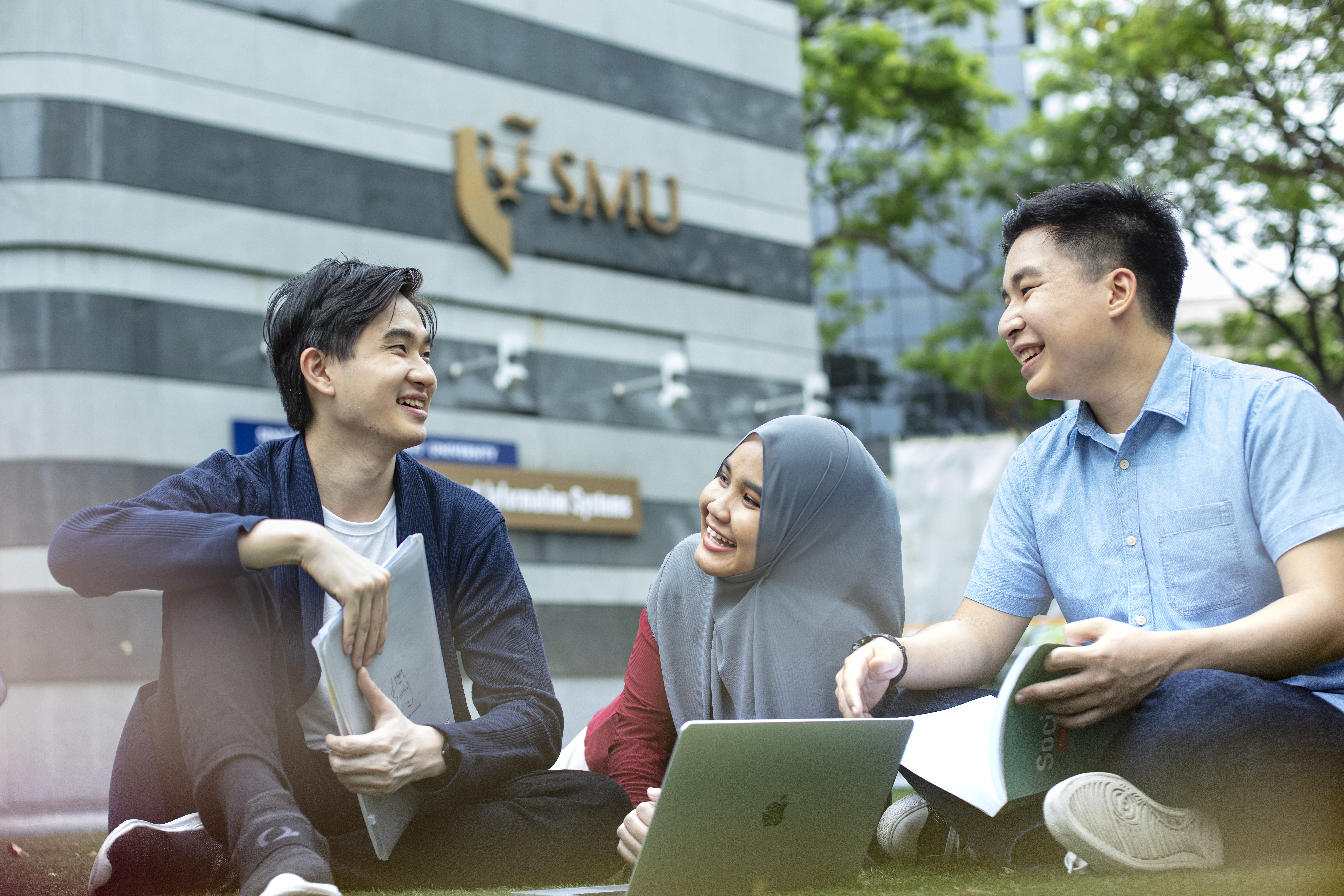18
MONTHS FULL-TIME (with flexibility to complete in 11 months)
30
MONTHS PART-TIME (with flexibility to complete in 23 months)
$57,770
Tuition Fee (Inclusive of GST)
Application Closes
Final: 31 May 2026
Pre-requisites
• Good undergraduate degree
• Good score in SMU Admissions Test or GMAT/GRE*
• A valid TOEFL/IELTS score is required if the medium of instruction of your undergraduate studies was not in English.
• Personal statements
• Updated resume
• Contact details of two referees
• For shortlisted candidates, 2 reference letters and an interview will be required.
• No work experience is required for admission to this programme
About The Master of Sustainability (MST)
The SMU Master of Sustainability (MST) programme delivers an inter-disciplinary curriculum, drawing on the breadth of domains across SMU schools to prepare students for current and future jobs in the green economy. Through the MST, students will engage in learning about the sustainable use of organisational and natural resources in service of socially equitable outcomes through an emphasis on essential core skills in sustainability reasoning, communication, coordination, and management. They would also gain familiarity with the UN Sustainable Development Goals (SDGs) and the fundamentals of Singapore's Green Plan 2030. Recognising the dynamic nature of sustainability roles across various sectors, the programme is led by the School of Social Sciences and College of Integrative Studies to prepare students for thriving careers in the green economy.
Why pursue the MST?
-
1
Inter-disciplinary programme
This first-of-its-kind programme at SMU merges the strengths of School of Social Sciences and College of Integrative Studies, offering an inter-disciplinary, industry-aligned curriculum that equips students with an integrative skillset for future sustainability leadership and meets employers' and students' professional objectives in the rapidly changing world.
-
2
Aligned with global regulatory frameworks
As the MST programme is designed to align with major international regulatory frameworks, such as the United Nations Sustainable Development Goals (UN SDGs), and the Singapore Green Plan 2030, students will benefit from a holistic education that reflects global priorities and best practices in sustainability.
-
3
In-depth core courses & specialised thematic tracks
Experience a robust learning journey designed to build a strong foundation in sustainability. Deepen your knowledge by selecting one of three thematic tracks in the areas of 'Sustainable Resource Management', 'Urban Systems Management', or 'Environment and Sustainable Development', or develop a broad sustainable lens without a specialisation.
-
4
Learn from distinguished academics & industry pioneers
Leverage the knowledge of esteemed faculty and industry leaders, who bring invaluable experience and insights to your learning journey. Their guidance will empower you to navigate the complexities of sustainability and excel in your chosen career.
-
5
Become Asia's next sustainability leader
As a sustainability leader, drive initiatives that foster environmental, social, and economic well-being. Champion sustainable practices to inspire organisations, communities, and industries to embrace responsible approaches for a brighter future.

Testimonials
Industries MST Graduates Will Work In
-
 Development Finance
Development Finance -
 Sustainability Reporting and Assurance
Sustainability Reporting and Assurance -
 ESG and Sustainability Solution Marketing
ESG and Sustainability Solution Marketing -
 Corporate Strategy and Development
Corporate Strategy and Development -
 Strategic Sustainability Consulting
Strategic Sustainability Consulting -
 Sustainability Policy Professional
Sustainability Policy Professional

Programme Details
Programme Calendar
Designed for flexibility, the MST programme is available in both full-time and part-time formats. It operates on 3 regular terms comprising 10 study weeks, 1 term break recess week and 1 week to administer examinations each term.
Track Options: SRM: Sustainable Resource Management; USM: Urban Systems Management; ESD: Environment and Sustainable Development
|
|
|
|
*Course listings are subject to change from term to term.
^Programme calendar is subject to change.
All classes are held either on weekday evenings from 7pm onwards, Saturday mornings from 8.15am onwards, or Saturday afternoons from 12pm onwards. These timings have been chosen to accommodate the schedules of part-time students who are working, and full-time students who might be engaged with industry attachments.
However, full-time students may have some weekday morning or afternoon classes (8.15am, 12pm or 3.30pm onwards) in their first term.
MST class sessions are 3 hours long, and are conducted in a highly interactive, seminar-styled manner. Class sessions combine lectures with discussions and group work. Through our pedagogy, students have the opportunity to interact closely with faculty, full-time professional instructors, and student teaching assistants. In addition, students also meet with industry experts who share their experiences and perspectives through regular seminars organised by the MST programme.
Programme Information
The MST programme is designed to empower you as a global citizen of tomorrow by providing a transformative educational experience and fostering meaningful engagement with the world around you. You are required to complete 7 core modules, 3 courses from one of three thematic tracks, 2 MST electives, an open elective, participate in an internship or SMU-X and complete the postgraduate professional development requirement.
|
||||||||||||||||||||||
1. The seven programme core courses are compulsory and non-exemptible.
2. The list of common electives is not-exhaustive and varies termly.
3. Politics of Water and Sustainable Infrastructure & Water are interchangeable under the Sustainable Resource Management track.
*The curriculum and courses are updated at the time of publishing and are subject to change without prior notice.
This course will introduce students to historical and recent trends in how theoretical concepts of sustainability have been framed, developed and implemented across global cities during the age of the Anthropocene. During weekly seminars, selected cases from the fields of engineering, architecture, urban studies, ecology, physical and the social sciences will be examined in the class, and students will infer theoretical principles of sustainability/sustainable development goals - most explicitly in synthesis seminars in the latter part of the course. Specific attention will be focused on Asian cities and the sustainability challenges faced by settlements within this continent, particularly with respect to local socio-economic, environmental and cultural aspects and contexts that contrast with global-scale sustainability trends.
This course provides students with the theoretical knowledge and practical tools to assess and manage collaborative governance effectively. Today’s social problems are complex, cross-boundary and unsolvable by traditional government tools and approaches. Policy problems are described as ‘wicked problems’ that lack a set of clear definitions, causes and effects, and solutions. The wicked nature of the policy problems requires considering multiple perspectives of diverse stakeholders and innovative policy solutions. This course explores how governments and their stakeholders experiment with new ideas, policies, governing processes, institutional arrangements, management tools, and technologies, to create public value and effect positive change.
This course looks at both the theory and practice of policy formulation and implementation in sustainability sectors as pertaining to the regulatory engagement of national and international jurisdictions with businesses and civil society. With a grounding in international frameworks of sustainability, namely the UN Sustainable Development Goals (SDGs), students would engage firstly with the main theoretical approaches to environmental politics. Thereafter, they would become familiar with the political, legal and regulatory dynamics surrounding major policy instruments dominating the sustainability landscape, such as taxes, subsidies, voluntary approaches, fees/charges, tradeable permits, deposit-refund systems, which dominate sectors such as transport, air and water pollution, energy efficiency, climate mitigation, land contamination and waste management. As such, this core course resonates with 3 UNSDGs in particular – partnerships, climate action and responsible consumption and production.
This course examines social stratification and inequality with a global perspective. It is designed to help students understand fundamental questions of “Who gets what, and why?” and to think critically about public policy issues pertaining to social and economic inequality. In doing so, this course resonates with UN Sustainable Development Goal (SDG) of ‘Reducing Inequalities’. The class will examine social class structure, gender inequality, racial/ethnic stratification, and other forms of inequality. Topics covered in the course include a study of questions of intergenerational mobility and how we can understand how inequality persists in a globalized world. Examples related to climate migration and environmental justice are also included as we address the following questions: How fairly are social and economic resources allocated in our society? What are the principal “fault lines” that define the class structure? What types of social processes and policies serve to maintain or alter racial, ethnic, and gender discrimination in the labour market? As a new class of professionals is emerging, will stratification systems take on new and distinctive forms in the future?
Systems thinking sets out to view systems in a holistic manner by exploring inter-relationships (context and connections), perspectives (each actor has their own unique perception of the situation) and boundaries. It is best suited for managing complex problems such as sustainable development. This course will introduce the principles and tools of systems thinking, and their application to the field of sustainability. The course will cover key concepts and tools such as feedback loops, systems archetypes, and causal loop diagrams, problems trees and explores how these can be applied to understand the complex interaction of the social, environmental, and economic issues.
Through this course, students would be able to master the different sustainability reporting and disclosure frameworks, gain insights in crafting a sustainability report and learn how to engage with stakeholders on ESG progress and performance. The course will build a foundational understanding of the key components of a sustainability report, train students in methods of preparing a quality report and meaningful disclosures while learning the metrics and standards used locally and internationally for sustainability reporting. Students will engage with industry guest speakers to understand how disclosures are being used by investors, fund managers and other stakeholders. Sustainability reporting frameworks that would be covered include the Global Reporting Initiative (GRI) Standards, as well as disclosure requirements such as Science Based Targets, Taskforce for Climate Financial Disclosures (TCFD) and the Carbon Disclosure Project (CDP).
This course helps students understand how sustainability challenges pose risks and opportunities to businesses and investors. It exposes students to emerging theories and practices on how businesses and investors can apply finance to manage sustainability risks and opportunities. Students will also learn how to frame managerial and investment objectives that are consistent with business sustainability. Topics covered in the course include Socially Responsible and Impact Investing, Microfinance, Responsible Lending, Green Finance, Climate Change and Finance Implication, and Corporate Social Responsibility (CSR) and Firm Performance.
SDG 2, “Zero Hunger”, aims to “end hunger, achieve food security and improved nutrition and promote sustainable agriculture.” This course explores the origins and problems of the current global food system and the dominant industrial agriculture model. Using theories from environmental sociology, agrarian political economy, and political ecology, we will critically investigate the social-political relations and environmental impact in various aspects of the food system, including agricultural production, food manufacturing and processing, food distribution and retail, food consumption, and global food trade. We will also explore the viability of alternative sustainable food systems and agriculture and debate the future of environmental sustainability.
This course provides a graduate-level understanding of the conversion principles and technologies behind various renewable energy sources, as well as surrounding energy access issues faced by different populations around the world (and especially in Asia). It also examines the issues involved in the integration of various renewable energy sources and their economics for heat, power, and transportation needs to meet grid-based and off-grid energy availability and affordability challenges. Based on the technical and sustainability trajectories identified by the International Energy Agency (IEA) and the UNFCCC, the future outlook for each of the sources and systems would be discussed. Instructors and guest lecturers will examine various renewable and conventional energy production technologies, energy end-use practices and alternatives, and consumption practices in different countries of Asia and students will engage with a comprehensive energy sustainability framework to discuss weighing different engineering, political, social, economic, and environmental goals related to energy generation, transmission and distribution in both urban and rural contexts in Asia. This course would resonate with SDG goals #7 (affordable and clean energy) and goal #13 (climate action).
The control of water matters. From agricultural production to fishing to national security, water is political. As population centers shift toward urban centers, international demands on water expand, food prices increase, and climate changes alter weather patterns, this precious, limited resource will only become more contentious in the future. In this course we will examine the underlying political issues that shape water management and the policies that governments make to deal with them. We will begin with domestic water issues, such as water management for food security, before turning to international water conflicts, like those brewing over the Mekong River and the Spratly Islands. In doing so, we will engage with theories of common pool resource management, policy making, and international relations. Most of our readings will focus on Southeast Asian cases. This course will investigate two major questions in political science: (1) Is there a need for a leviathan-style state to overcome the “tragedy of the commons”? (2) How does the international system deal with common pool resources? Does the international system need a leviathan?
Through looking at these questions, the course encourages students to become more aware of, interested in, and involved in the political and policy issues regarding natural resource management. As such, this course touches on on multiple Sustainable Development Goals, including clean water and sanitation (#6), climate action (#13), and life below water (#14).
This course examines the impacts and risks that climate change presents on business communities, as well as articulating the roles that businesses have in enhancing climate adaptation and mitigation via their management and operations. Through case studies from Asia, students will see how the interactions of businesses with governments and communities can enable climate resilience. (SDGs * & 9)
This course will interrogate the theoretical and conceptual frameworks related to understanding the circular economy, and draw on empirical examples to distil the practical implications and challenges involved in this approach. Through an investigation into various urban waste streams, including food waste, electronic waste, and packaging waste, this course will provide an empirically-grounded analysis of the circular economy approach, with an emphasis on the operational and application-oriented challenges related to adopting the circular economy approach in industry (SDG 12).
How many cars to have on the road? How to manage municipal solid waste? Should we build sea walls? Which sustainable energy technologies to transition to? Each individual discipline offers powerful tools to better understand and engage with urban sustainability issues. Using examples from Asia, this course will demonstrate how different disciplines (e.g., economics, politics, sociology, geography, law, psychology, history, computer sciences) frame and engage with urban sustainability issues and what their strengths and limitations are. Finally, students will critique and reflect on a transdisciplinary approach to urban sustainability based on heuristics.
Interested in making a true impact in society? The harsh reality of the mainstay of a large array of social problems in Asia such as persistent poverty, income inequality, non-inclusive economic development, ethnic and religious conflicts, and environmental hazards among others, has led to an increased interest in how social innovators can utilize entrepreneurship as potential solutions to these problems. Social entrepreneurship has gained prominence as a field that drives social change in areas where the traditional philanthropic model has become overwhelmed in achieving sustainable change. The course will serve as an introduction to the social enterprise ecosystem in Asia, how it operates, its challenges and success stories. Through critical analysis of case studies from across the continent, best practices will be identified. Out-of-classroom sessions and site visits will help the theoretical concepts come alive in the real world. Additionally, in line with the practical focus of this course, students will get opportunities to engage in systems thinking in defining problems, business model presentations, developing funding strategies and evaluating social impact, during classroom activity sessions. This course will focus on some key steps in envisioning a social enterprise and how these can be applied to develop a scalable social business idea.
The main objective of the course is to provide an understanding of the causes and solutions to environmental problems, such as pollution and climate change, from an economic perspective. In particular, students will learn: the economic concepts that describe an efficient allocation of resources; the concepts of market failure, externalities, public goods and property rights; how to apply benefit-cost analysis to environmental policies; the sources and types of pollution and how economic policy can reduce their emission; and the economics of climate change and the role of adaptation and mitigation. As such, this course will touch on the UN Sustainable Development Goal #8 Decent Work and Development Growth.
What explains the successful record of poverty reduction? Why are so many still poor? What will be the long-term impact of climate change and COVID? What can we do to ensure that poverty reduction continues in the future? Answering these questions requires exploring poverty and underdevelopment, both in history and today. After scrutinizing different conceptions of development and poverty (and the relationship between them), we will explore the role that the government, non-government organizations and civil society play in reducing or exacerbating poverty. We will also explore the part played by culture, gender, racism and violence. Central to each of these is the question of the role that power plays in reducing—and exacerbating—poverty.
Throughout the course, we will focus on both seminal and cutting-edge theories related to understanding development and poverty. In the process, we will compare and contrast the examples from developing countries throughout the world—focusing mainly on rural poverty. We will also apply powerful analytical tools, including the comparative method and hypothesis testing, to examine and analyze some of our most treasured assumptions and conclusions about the world. All the while, we will be seeking practical ways to address the ongoing scourge of poverty. This course reflects an emphasis on the main UN Sustainable Development Goal (SDG) #1 of ‘No Poverty’.
Today’s pressing sustainability issues, such as climate change, pollution, and loss of biodiversity, are largely anthropogenic. Addressing these problems, therefore, requires an understanding of human psychology and behavior. In this course, we use psychological theories and empirical findings to understand thoughts, feelings, and behaviors regarding environmental problems. We cover various—individual, social, and cultural—factors and levels of processes to find the psychological roots of various environmental problems as well as solutions to address these problems. Specific topics include risk perceptions, values, group identity, and social norms.
This course introduces the promise and challenges of sustainable and resilient infrastructure in the context of finite water and other planetary resources and climate risk. Adopting an action orientation, students will learn to identify public policies, individual and collective actions that are effective and feasible. The course will also consider barriers and the reasons why seemingly beneficial policies for infrastructure are not adopted and implemented. Drawing on case studies of policies and initiatives surrounding sustainable infrastructure from around the world, students in the course will consider how, whether, and when they can be applied in Asian contexts.
The need for sustainable development is quickly emerging as an area of focus among businesses, organisations, governments and the media. This course will introduce students to the fascinating environmental, economic and social dimensions and intersections for sustainability and various streams of law and policy. Students will gain exposure to a range of current developments involving sustainability locally and globally, while reflecting on current laws and policies that address them. Students will explore the environmental, economic and social dimensions and intersections between sustainability and the different fields of law and policy through meaningful discussions, research and sharing of current real-life topics and developments. A field trip may be arranged to enrich students with their perspectives.
This course explores the application of behavioural science in sustainability-related decision-making, policy design, and strategic interventions. Students will engage with theoretical frameworks and practical applications to develop an understanding of how behavioural insights can drive sustainable change. The course covers key behavioural theories, research methodologies, intervention strategies, implementation techniques, and evaluation mechanisms.
In a world grappling with urgent sustainability challenges, digital technologies offer a transformative pathway to bridge the gap between current progress and ambitious global targets. This course equips students from all backgrounds with the technical knowledge, practical skills, and critical thinking necessary to address these challenges through innovation.
There is a powerful synergy between sustainability and innovation in business and society. The term ‘sustainable innovation’ refers to the creation of new market space, products and services or processes driven by social, environmental or sustainability concerns. Just like general innovation, sustainable innovation goes way beyond incremental improvements of products, services, or processes. The challenge is to proactively embrace risk management and sustainability considerations aimed at aligning (novel) business strategies with the Sustainable Development Goals to create and capture new value. This course will introduce students to the dos and don’ts of integrating sustainability into business practice based on effective policies, processes and frameworks, board governance, senior management strategy, and stakeholder management.
This module explores the intersection of AI and sustainability, focusing on how AI technologies can be leveraged to address environmental challenges. Students will learn about the principles of sustainable development and the role of AI in promoting energy efficiency, reducing carbon footprints, and enhancing resource management. Through case studies and practical applications, the module will highlight innovative AI solutions in areas such as climate modelling, smart cities, and sustainable agriculture.
The Postgraduate Professional Development Course (PGPD) comprises a series of short seminars delivered by SMU faculty who are leaders in their fields and supported by trained industry experts. The PGPF complements classroom-based learning with provocative, interactive workshops that are key to sustained personal and professional growth. You will be able to select and self-register for the workshops you qualify for during designated dates throughout the year, completing the PGPD as part of your graduation requirements.
You will find the topics engaging and diverse, ranging from interpersonal effectiveness and communication, critical/creative thinking skills and negotiation to leadership, organisational behaviour, data analytics, spreadsheet modelling, innovation, and business sustainability.
Events

How to Apply
Application Period
The Programme accepts applications on a rolling basis. Applications should be submitted no later than 30 June for the intake starting in August of the same year.
| APPLICATION DEADLINE | |
|
Final |
30 June 2025 |
Please read the following instructions carefully before completing your application. Supplementary instructions are given in each section of the application form. Once you have completed the form, we suggest you keep a copy for your record. Please complete the application form accordingly and attach copies of the documents as instructed. Your application will only be processed when we have received all the documents and payment.
Completing the Online Application
While filling in your application, take note that you will be required to submit the following:
- Updated Resume
- 2 Personal Statements
- Contact details of two referees. For shortlisted candidates, 2 reference letters, and an interview may be required.
- Copy of NRIC/FIN/Passport (in PDF or JPEG format)
- Softcopies of relevant certificates and academic transcripts
Personal Statement Questions:
(1) Explain in 500-600 words your career and personal aspirations, and your motivation for pursuing the Master of Sustainability.
(2) Discuss in 500-600 words one of the following topics:
i) describe your greatest weakness and how you have tried to overcome it; or
ii) describe your outstanding talents, skills and inherent abilities that are not reflected in your academic qualifications and records; or
iii) describe the situation with the greatest ethical complexity that you have faced in your professional or academic life, and how your input helped resolved it.
After Submitting Your Application
The Admissions Team will follow-up with your application within 3-5 working days. More information on how to practise and sit for the SMU Admission Test will be provided during this time.
Important Notes:
- Verification of original documents is required upon matriculation into the programme. Failing to do so may result in applicants having to withdraw from the programme.
- If you have not taken the GMAT or GRE, you are encouraged to take the SMU Admission Test. Alternatively, you may first submit your online application and arrange for the GMAT/GRE test to be taken as soon as possible. Do include the date of your test as well.
- Shortlisted candidates would be invited for an interview.
The Master of Sustainability (MST) Programme welcomes applicants with the following qualifications:
- Applicants from all degrees and those looking to transit into sustainability related roles are encouraged to apply.
- No prior work experience is required.
- A good GMAT/GRE/SMU Admission Test score.
Exceptions:
Undergraduate CGPA may be used in place of GMAT/GRE/SMU Admission Test scores for the following applicants:
- SMU Bachelor’s degree graduates with a minimum cGPA of 3.4/4.0 (within 5 years of graduation)
- SUTD/NUS/NTU/SUSS/SIT Bachelor’s degree graduates with a minimum cGPA of 3.6/5.0 (within 5 years of graduation)
Note: Meeting the cGPA academic criteria above does not guarantee admission and candidates may still be recommended to submit GMAT/GRE/SMU Admission Test scores.
- IELTS, UKVI (Academic) or TOEFL is required for applicants whose Degree programme (Bachelor's/Master's/PhD) was not taught in English.
Minimum Requirements [IELTS/UKVI (Academic)/TOEFL]: IELTS/UKVI (Academic) - Min 6.5, or TOEFL - Min 90.
SMU Admissions Test
Applicants are strongly encouraged to attempt the SMU Admissions Test if they do not have a GMAT/GRE Score Report. Details of this test will be provided to applicants who submitted their applications successfully.
For more information about the SMU Admissions Test, please click here
GMAT/GRE & IELTS/TOEFL Score Reports
EITHER the SMU Admissions Test OR GMAT (Graduate Management Admission Test) / GRE (Graduate Record Examinations General Test) is mandatory for admission to the MST programme. Applicants who do not have a GMAT/GRE Score are strongly encouraged to attempt the SMU Admissions Test.
Students who did not attempt their undergraduate studies in English are required to attempt the IELTS (International English Language Testing System) and TOEFL (Test of English as a Foreign Language). It must be taken within the last two years at the time of submitting your application.
For all the abovementioned tests, you may first email the unofficial score to the Admissions Team while requesting for the test centre to send the official score to SMU.
Official Score Reports can be sent via the following Institution Codes:
| TESTS | INSTITUTION |
|
GMAT |
F8D-02-56 |
|
GRE |
2861 (Department Code: 4102) |
|
TOEFL |
TOEFL: 9014 (Department Code: 82) |
- Singapore Citizens, Permanent Residents and Foreigners are welcome to apply.
- International students who are not working in Singapore must pursue the programme in full-time mode. Our admissions office will assist full-time international students in the Student Visa application. Please note that acceptance into the full-time programme does not guarantee successful application of Student Visa.
- Admission interviews will be conducted for short-listed candidates.
PROGRAMME FEES
Application Fee* | Registration / Advance Tuition Fee* | Tuition Fees for AY 2025 |
|---|---|---|
| S$100 (inclusive of GST) |
Amount payable upon acceptance to the programme. The registration fee covers matriculation, examination fees, orientation activities, library and computer account. | S$57,770 (inclusive of GST)
Fees are subject to change from year to year |
Application Fee* |
|---|
| S$100 (inclusive of GST) |
Registration / Advance Tuition Fee* |
|---|
Amount payable upon acceptance to the programme. The registration fee covers matriculation, examination fees, orientation activities, library and computer account. |
Tuition Fees for AY 2025 |
|---|
S$57,700 (inclusive of GST)
Fees are subject to change from year to year |
A deposit of $5,000 would be required upon acceptance of offer into the programme. The remaining tuition fees would be payable over 3 instalments, over the duration of the programme. The tuition fee does not include meals, air travel, travel insurance, living and accommodation expenses incurred for the overseas field study missions, exchanges and SMU-XO courses. Singapore Management University reserves the right to alter tuition and other fees as deemed appropriate.
*All fees are non-refundable and non-transferable.
*Goods and Services Tax (GST) is a tax collected on behalf of the Singapore Government and will be charged at the prevailing rate.
Students who continue their study beyond the normal duration will be charged an admin fee as follows:
| MODE | DURATION | ADMIN FEE CHARGEABLE FROM | AMOUNT |
|---|---|---|---|
| Full-time | 5 Terms (with flexibility to complete in 11 months) | 6th term onwards | S$2,725 per term (inclusive of GST) |
| Part-time | 8 Terms (with flexibility to complete in 23 months) | 9th term onwards | S$2,725 per term (inclusive of GST) |
Term refers to the 12-week period during which the courses are delivered and inclusive of the recess week and exam week.
Discounts
Nationality
|
Discount |
||
|
Singapore Citizen / Permanent Residents |
S$5,000 |
|
|
ASEAN |
S$3,000 |
|
University Affiliations
|
Discount |
||
|
SMU Alumni |
S$8,000 |
|
|
SAF CE Scholars |
S$6,000 |
|
|
Alumni from the 5 Singapore Autonomous Universities |
S$4,000 |
|
|
SMU International Student Exchange Programme (ISEP)/ |
S$4,000 |
|
The above discounts are applicable to students joining the programme from August 2025 intake onwards.
Each student is only eligible for one discount. Should a student qualify for more than one discount, only the higher discount will be applicable.
The above tuition fee discount is deductable before Goods and Services Tax (GST).
Alumni from the 6 Singapore Autonomous Universities (SMU/NUS/NTU/SIT/SUSS/SUTD) within the last 5 years of graduation may enjoy additional exemption discounts of $3,000 per CU, max of 2 CUs for eligible courses exempted. SMU reserves the right to change these exemptions at any point in time.
Scholarships, Award and Financial Aid
* All candidates are automatically submitted for consideration for MST Academic Excellence Scholarship, MST Scholarship and SMU Masters ASEAN Scholarships upon meeting the respective scholarship criteria.
The MST Academic Excellence Scholarship aims to encourage exceptional applicants of any nationalities who display outstanding academic qualifications to pursue the MST programme.
Tenure and Benefits of the Scholarship
- Each scholarship, valued at S$10,000 is tenable for the duration of the scholar's studies, subject to good academic results.
- The Scholarship will offer partial financial support towards tuition fees.
- No bond is required of the scholarship recipients.
No application is required for the MST Academic Excellence Scholarship, which is awarded to students enrolled in the MST programme after due consideration by the faculty, based on the criteria listed below.
Eligibility Criteria
To be eligible for this scholarship, applicants must meet the following criteria:
- Have outstanding academic results.
- Demonstrates leadership potential, resourcefulness, and innovative thinking.
- Possesses qualities to be a good ambassador of the MST.
- Must not be a concurrent recipient of other scholarship or sponsorship.
Obligations:
The MST Academic Excellence Scholarship recipient should aspire to be a role model for other students and serve as an ambassador to promote the programme by participating in outreach activities.
Academic Standing:
The MST Academic Excellence Scholarship covers the entire duration of studies on condition that the recipient maintains a cumulative minimum GPA (Grade Point Average) of 3.0. If the cumulative GPA falls below 3.0, the scholar will be issued a warning and allowed to have a maximum of one (1) term to improve his or her performance. Should the recipient fail to maintain a cumulative GPA of 3.0 in the term following the receipt of a warning, the MST Programme Office reserves the right to revoke the Scholarship. All scholars’ academic performance will be reviewed at the end of every term.
The MST Scholarship aims to encourage outstanding applicants of any nationalities to pursue the MST programme to improve the classroom diversity.
Tenure and Benefits of the Scholarship
- Each scholarship, valued at S$5,000 is tenable for the duration of the scholar's studies, subject to good academic results.
- The Scholarship will offer partial financial support towards tuition fees.
- No bond is required of the scholarship recipients.
No application is required for the MST Scholarship, which is awarded to students in the MST Programme after due consideration by the faculty, based on the criteria listed below.
Eligibility Criteria
To be eligible for this scholarship, applicants must meet the following criteria:
- Have good academic results.
- Demonstrates leadership potential, resourcefulness, and innovative thinking.
- Possesses qualities to be a good ambassador of the MST.
- Must not be a concurrent recipient of other scholarship or sponsorship.
- Special consideration may be given to students with financial needs.
Obligations:
The MST Scholarship recipient should aspire to be a role model for other students and serve as an ambassador to promote the programme by participating in outreach activities.
Academic Standing:
The MST Scholarship covers the entire duration of studies on condition that the recipient maintains a cumulative minimum GPA (Grade Point Average) of 3.0. If the cumulative GPA falls below 3.0, the scholar will be issued a warning and allowed to have a maximum of one (1) term to improve his or her performance. Should the recipient fail to maintain a cumulative GPA of 3.0 in the term following the receipt of a warning, the MST Programme Office reserves the right to revoke the Scholarship. All scholars’ academic performance will be reviewed at the end of every term.
The SMU MASTERS ASEAN Scholarship incentivizes good applicants from ASEAN countries to pursue SMU Master’s Degree programmes, and to increase the diversity and overall learning experience in the classroom.
Tenure and Benefits
- The scholarship comprises a monetary award of S$10,000 (inclusive of GST) that co-funds outstanding individuals in his/her pursuit of the MST.
- No bond is required of the scholarship recipient.
- All eligible applicants are automatically considered for the scholarship; no additional application is required.
Eligibility criteria
- The scholarship is open to citizens of ASEAN member countries or observer nations (Papua New Guinea and Timor-Leste).
- Recipient must matriculate into the MST programme to receive the award. Deferment of studies beyond SMU’s financial year would void the scholarship award.
- Candidate’s academic entry criteria is “very good” or “excellent” (Minimum GMAT score 650 or equivalent).
- Demonstrates leadership potential.
- Possesses qualities of MST ambassador.
- Must not be a recipient of other scholarship or sponsorship.
- Special consideration may be given to students with financial needs.
- Must not be a concurrent recipient of any other scholarship or sponsorship.
Obligations
Recipients of the SMU Masters ASEAN Scholarship are expected to be good ambassadors of SMU, participate actively in the development of student life and alumni networks as well as assist to enhance awareness of the MST programme, especially to potential applicants from their home country.
The SMU Warriors Scholarship (SWS) aims to recognise and reward Singapore's military personnel for their contribution to our nation. It aims to equip retiring SAF military servicemen with advanced knowledge and skills to help them successfully transit from military service to a second career. Building on their illustrious career and experience in the military, the SMU postgraduate degrees will give them an added edge to advance and succeed in their new careers. For more details, please visit SMU Warriors Scholarship | SMU PG Admissions
Eligibility criteria
Only MINDEF personnel who are Singapore citizens with not less than 10 years of full-time military service shall be eligible to apply for the Scholarship. The Scholarship applicant mus
- Either:
- be due to retire from MINDEF within no more than 3 years after the start of the relevant programme; or
- have retired from MINDEF for not more than 1 year prior to the start of the relevant programme; and
- in any event must be in-service at the point of application to SMU.
- Satisfy all admission requirements imposed by the relevant postgraduate degree which may include acceptable GMAT Scores, essays, admission interviews, etc. (please check detailed requirements online)
- Be recommended by SAF Personnel Management Centre (PMC) and Career Transition Resource Centre (CTRC)
Jollibee Group Foundation (JGF) is the social responsibility arm of Jollibee Foods Corporation (JFC, also known as Jollibee Group), one of the fastest-growing restaurant companies in the world, with a mission to serve great-tasting food and spread the joy of eating across the globe. The foundation is committed to uplifting the lives of underserved communities in the Philippines through various sustainable programs.
As part of a food company, the programs of the Foundation are focused on helping Filipino families have access to food and improve their lives through its programs in Agriculture, Education and Disaster Response. By implementing these programs in partnership with local governments, NGOs, and communities, the Jollibee Group Foundation helps build a brighter future for all, embodying the spirit of service and joy that defines the Jollibee Group.
The Jollibee Group Foundation is one of several contributors to the SMU Philippine Community Fund. This visionary fund signifies a steadfast commitment to empower and uplift Filipino students embarking on their journey towards higher education at SMU and is dedicated to making a positive impact through educational advancement and catalysing industry growth. Through the generous support of our donors and industry leaders in the Philippines, an array of opportunities will be offered to brilliant Filipino students, including scholarships at the postgraduate and undergraduate levels, exchange scholarships, and innovation internship grants for all undergraduate students. With these diverse avenues for growth and learning, the SMU Philippine Community Fund will uplift the lives of students and the entire Filipino community and aims to shape future leaders and innovators who will bring about transformative change for the industry, community, and nation.
Tenure and Benefits of The Scholarship:
- Each scholarship award is valued at S$20,000.
- Each scholarship is tenable for the duration of the scholar's studies (up to two years), subject to good academic results.
- The Scholarship will offer financial support towards MST tuition fees.
- No bond is required of the scholarship recipients.
- A separate application for the Jollibee Group Postgraduate Scholarship is required, after application to the MST programme has been completed.
- Valid for 2024-2026 intakes.
- Successful MST applicants will be required to submit a separate application form for the scholarship here.
Eligibility Criteria:
To be eligible for this scholarship, applicants must meet the following criteria:
- Full-time students who are successfully admitted to the MST programme.
- Citizens of the Philippines.
- Good academic achievements, as determined by SMU.
- Those with demonstrated greater financial needs will be prioritised.
- Must not be a concurrent recipient of other scholarship or sponsorship.
- Valid for 2024-2026 intakes.
- Successful MST applicants will be required to submit a separate application form for the scholarship here.
Academic Standing:
The Jollibee Group Foundation Postgraduate Scholarship is tenable for the duration of the scholar's studies (up to two years), on condition that the recipient maintains a cumulative minimum GPA (Grade Point Average) of 3.0. If the cumulative GPA falls below 3.0, the scholar will be issued a warning and allowed to have a maximum of one (1) term to improve his or her performance. Should the recipient fail to maintain a cumulative GPA of 3.0 in the term following the receipt of a warning, the MST Programme Office reserves the right to revoke the Scholarship. All scholars’ academic performance will be reviewed at the end of every term.
Established in honour of Singapore's former Prime Minister Mr Lee Kuan Yew, this scholarship is synonymous with prestige and a commitment to serving Singapore. It recognises outstanding individuals with strong academic aptitude and the inclination to serve and contribute to the Singapore society at large.
Scholarship recipients will receive full tuition fees coverage and an annual allowance of S$50,000 for up to 2 years if they are pursuing a Master’s degree. Public sector awardees who are already sponsored by their agencies for their postgraduate studies will receive a one-off sum of S$10,000. They will not receive sponsorship of tuition fees and the annual allowance from the Lee Kuan Yew Scholarship.
Eligibility criteria:
- A Singapore citizen with at least a Second Upper Honours Degree or equivalent Degree
- Excellent track record of leadership and service within or beyond applicant's profession
Applicants who wish to pursue a Master's Programme in General Management should preferably have at least four years of working experience. Public Officers are required to submit their applications through Chief Executive Officers or Permanent Secretaries.
For more information and application form/procedures, please click here.
The CIMB ASEAN Scholarship is a highly selective, full scholarship for exceptional students from ASEAN countries in which CIMB has a presence. Beyond financial support, the Scholarship which comes with a bond also provides professional development and a mentor support system designed to empower the region's young talent to build a bright future and make a difference for those around them. Scholars can hit the ground running as CIMB offers exciting employment opportunities right after graduation.
In recognition of the evolving nature of the banking industry, CIMB welcomes applicants from a wide variety of academic disciplines.
Please read more about the CIMB ASEAN Scholarship and take note of the application window here.
Basic Eligibility:
- A citizen of either Malaysia, Indonesia, Singapore, Thailand, Cambodia, Vietnam or Philippines.
- Aspire to pursue a career in the financial and banking industry.
- Applicants who are about to start their undergraduate degree or Master’s programme or those who have already started and have a minimum of one full academic year remaining.
- Min. CGPA of 3.25/4.0 score or equivalent with excellent academic track record and active in curricular activities.
- Applicant must not be a recipient of any other scholarship that comes with contractual obligations such as a service bond.
Mrs Serene Tan-Johnson (BBM, 2004) is an experienced energy and sustainability leader with over 20 years of global experience and she is recognised for her commitment in advancing the energy transition. As an SMU pioneer class alumna, she has dedicated the Sustainability Stewardship Award with the faith that the next generations will embrace the responsibility of shaping a more resilient, inclusive, and sustainable world. The Award aims to motivate exceptional MST students to take up the challenge of bringing sustainability to the leadership of businesses.
The Award will provide recognition to the top graduating student in the Master of Sustainability programme.
Tenure and Benefits
- Prize value of S$3,000.
- One (1) Award will be awarded in each academic year
Eligibility Criteria
- Candidates must be matriculated Master of Sustainability students in their final year of study.
- The Award will be awarded to the top student who has achieved exceptional academic results and demonstrated commitment in the sustainability industry.
- Eligible candidates would be invited to respond to questions pertaining to their area of study and future endeavours in sustainability, which will be vetted by the review committee.
- Candidates must not have any disciplinary records during their candidature at the University.
- No Award will be given if there is no candidate of sufficient merit to qualify.
Attractive discounts are available to eligible students including SMU Alumni, Singapore Citizens and Permanent Residents, MINDEF/SAFTI staff, ASEAN Nationals and other groups. Please visit HERE for details.
SMU reserves the right to amend the discount schemes without prior notice.
All discounts are exclusive and will not be applied in conjunction with other ongoing discount schemes. Where a student qualifies for more than one discount, only the higher discount amount will be applicable.
- Scholarships are available for deserving students.
- SkillsFuture funding for Singapore Citizens:
1. Singaporeans aged 25 and above can use their SkillsFuture Credit to offset the tuition fees. Click on this link for more details.
2. The SkillsFuture Level-Up Programme offers Singaporeans aged 40 years and above the opportunity to receive the SkillsFuture Credit (Mid-Career) Top-up of S$4,000. This credit is intended to help offset out-of-pocket tuition fees, starting from the Academic Year 2024/2025 intake, commencing on or after 1 May 2024. Please visit https://www.skillsfuture.gov.sg/level-up-programme for further details.
- Singapore Citizens with eligible Post Secondary Education Account (PSEA) may utilize balance funds for tuition fees. Click on this link for more details.
- Students seeking for financing aid may approach their local bank(s) directly to enquire and apply for the various study loan packages.
CIMB Bank Loan
For more information, please call 6333 7777 or visit CIMB https://www.cimb.com.sg/en/personal/banking-with-us/loans-financing/personal-loans-financing.html
POSB Further Study Assistance:
For more information, please call 6333 0033 or visit POSB https://www.posb.com.sg/personal/loans/education-loans/posb-further-study-assist
Email: personalloans@dbs.com
Maybank Education Loan:
The application must be with a joint applicant who is a Singaporean or Singapore PR.
For more details, please visit Maybank https://www.maybank2u.com.sg/en/personal/loans/personal-credit/education-loan.page
• 1800-629 2265 (1800-MAYBANK)
• (65) 6533 5229 (Overseas)
RHB EDU Loan:
For more information please call 1 800 323 0100 or visit RHB.
OCBC Education Loan:
For more information please call 1 800 438 3333 or visit https://www.frankbyocbc.com/products/investments/edu-loan
State Bank of India:
SBI provides student loans exclusively for students from India who have secured admission in selected educational institutions for higher studies in Singapore. Your loan is secured against a Standby Letter of Credit (SBLC) issued by SBI branch in India, backed by mortgage of property or cash deposits in India.For more information, please call 1 800 724 7464 / 6228 1116, or email studentloan@sbising.com or visit SBI https://sg.statebank/

FAQ
- Curriculum & Enrolment
- Admissions
- SMU Admission Test Information
- Fees & Financial Assistance
- Career Support
- Immigration Matters & Accomodation
The Sustainable Resource Management (SRM) track focuses on the principles and practices of managing natural resources sustainably. This includes an understanding of the complex ecological, social, and economic factors that affect sustainable agriculture, energy, and water, as well as the tools and strategies used to address these challenges.
The Urban Systems Management (USM) track focuses on the principles and practices of managing sustainable urban systems. The understanding of complex social, economic, and environmental factors that affect urban systems, as well as the tools and strategies used to address these challenges, will be taught and applied.
The Environment and Sustainable Development (ESD) track emphasises on the interconnections between environmental issues, social issues such as poverty, and economic growth. Students will understand the complex interactions of these factors and apply the relevant tools and strategies to address these challenges.
Alternatively, develop a broad sustainable lens without a specialisation.
Full-time Candidature: A minimum of one year and up to 5 terms.
Part-time Candidature: A minimum of two years to a maximum of 8 terms.
Candidature that extends beyond the maximum candidature period will incur additional administrative fees.
During a regular term, full-time students may take up to 5 Course Units (CUs), while part-time students may take up to 3 CUs. Students may also choose to distribute their workload by enrolling in special terms within their normal candidature period. Special terms, held from July to August and November to December, and are more intensive with 10 sessions delivered through twice-weekly classes.
Students may switch between Full-time and Part-time modes of candidature at any time, but the change can only be made once.
Please note that any switch request is subject to approval from the MST programme director. The maximum study candidature will be re-adjusted according to the number of remaining Course Units (CUs).
Students may switch to another track after declaration, but the change can only be made once. Please note that any switch request is subject to approval from the MST programme director. Students who wish to switch to another track are advised to do so early during their study candidature, so that they are able to fulfil the graduation requirements of the new track within their candidature period. Please note that extended candidate arising from switching tracks may incur administrative fees.
The MST commences around mid-August of each year.
In such cases, students should apply for a Leave of Absence (LOA), subject to approval from the MST programme director. The maximum allowable LOA for both modes of study is 1 year (or 3 full terms, but need not be consecutive). LOA will not be counted within the candidature period. Please note that LOA may begin only after completing a current term of study.
All classes are held either on weekday evenings from 7pm onwards, Saturday mornings, or Saturday afternoons. These timings have been chosen to accommodate the working schedules of our part-time students who are concurrently working and our full-time students who are engaged with industry attachments.
Students may read up to 2 additional CUs beyond the graduation requirement. An additional tuition fee of S$3, 000 (excluding prevailing GST) applies for every additional CU. Students are required to decide upfront if they would like the additional CU(s) to be graded.
There are no provisions for student exchange at the moment but there are plans to secure opportunities for students to immerse themselves in different cultures, gain new perspectives and broaden their experiences through overseas exchange and study mission programmes at some of the world’s leading universities.
Yes. The MST programme director and manager works closely with our industry partners and SMU Career Services Office to offer internship opportunities for our students.
Typically, the internship period is 10 weeks. Students do their internship during the one year full-time study candidature. Students may do their internship during term time (office hours) and still take classes in the evening.
Please refer to the Admissions page for more details.
Yes, applicants with a keen interest on sustainability and ESG may apply to the programme. As sustainability is a rapidly evolving and developing space, we take into consideration the candidate’s interest, aptitude, GMAT/GRE scores, recommendation from referees, previous academic achievements and admission interview performance when doing our assessment.
Work experience is not mandatory . Nevertheless, professional experience derived from full-time and part-time employment as well as internships can enhance an applicant's profile.
A GMAT/GRE test score is required for all candidates as it gives us a base to compare candidates from different backgrounds to ensure each of our students can manage the academic rigour of the programme.
Alternatively, applicants may choose to take the SMU Admission Test in lieu of GMAT/GRE as entry criteria to the MST programme. Learn more about the SMU Admission Test here.
In some cases, depending on your overall credentials, the MST Admissions Team may still advise candidates to take the GMAT/GRE test to improve your chances for admissions offer.
The following groups of candidates are exempted from GMAT/GRE/SMU Admission Test:
- SMU Bachelor’s degree graduates with a minimum cGPA of 3.4/4.0 (within 5 years of graduation)
- SUTD/NUS/NTU/SUSS (including UniSIM)/SIT Bachelor’s degree graduates with a minimum cGPA of 3.6/5.0 (within 5 years of graduation)
However, meeting the cGPA academic input does not guarantee acceptance and candidates may still be asked to take the GMAT/GRE/SMU Admission Test.
Yes, you can submit your application prior to taking the GMAT/GRE. Once you have completed your online application, an officer from our admissions team will get in touch with you within a month to advise you on the next steps, including the submission deadline for your GMAT/GRE exam scores. You will also be informed if you are shortlisted for an admission interview with our programme director.
More details on the GMAT test centre can be found at: https://www.mba.com/the-gmat-exam. For details on GRE, please refer to: https://www.ets.org/gre.html
SMU’s GMAT Code: F8D-02-56
SMU’s GRE Code: 2861
IELTS, UKVI (Academic) or TOEFL is required for applicants whose Degree programme (Bachelor's/Master's/PhD) was not taught in English.
Minimum Requirements [IELTS/UKVI (Academic)/TOEFL]: IELTS/UKVI (Academic) - Min 6.5, or TOEFL - Min 90.
SMU’s TOEFL Code: 9014
Yes. Please note that requests to transfer from one candidature to the other will only be allowed once.
Yes. We will contact you for an admission interview after receiving your online application.
There is one intake in August every year. We encourage applicants to apply as early as possible.
Application Deadlines: 30 November, 28 February, 30 April of each year
It will take about a month or so to evaluate your application (including arranging for an interview with you, if you have been shortlisted). If you are admitted into the programme, you will be given about a month to decide.
Limited extensions of the decision deadlines are possible. Please note that we can only evaluate your application once you formally submit it.
Deferment is possible but you will have to pay the $5,000 acceptance fee in order to secure your place. Otherwise the offer will lapse and you will have to re-apply and be re-considered.
• All MST applicants are eligible to take the SMU Admission Test in lieu of GMAT/GRE as entry criteria to the MST programme.
• The SMU Admissions Test score cut off is an overall score of 55.
• Undergraduate CGPA may be used in place of GMAT/GRE/SMU Admission Test scores for the following applicants:
• SMU Bachelor’s degree graduates with a minimum cGPA of 3.4/4.0 (within 5 years of graduation)
• SUTD/NUS/NTU/SUSS/SIT Bachelor’s degree graduates with a minimum cGPA of 3.6/5.0 (within 5 years of graduation)
• Each applicant is only allowed a maximum of 3 test attempts per intake (including deferment). A test fee is payable for every test attempt.
• Click here for the SMU AT Factsheet and here for the SMU AT Guide
Make online payment for $125 (inclusive of GST) test fee at: eservices.smu.edu.sg.
Do note that test fee payment is non-refundable.
After payment has been processed, email your payment receipt to MST@smu.edu.sg and the MST programme manager will issue you a test account.
Please perform the test without any aid. During the test, you are not supposed to refer to any book or reference materials, be it physical form or online.
Once the SMU admission test has started, you must complete all 3 test components at one go.
The online testing environment should mimic the ‘in class’ testing environment, and must conform to the following:
Testing Area:- Sit at a clean desk or clean table (not on a bed or couch).
- Lighting in the room must be bright enough to be considered “daylight” quality.
- Overhead lighting is preferred. Please ensure that your face is fully visible for virtual proctoring and not obscured by backlight.
- Be sure the desk or table is cleared of all other materials. This means the removal of all books, papers, notebooks, mobile phones, tablets and other electronic devices. However, below are permitted:
- Non-scientific calculator (calculator app on handphones, tablets or computers are not allowed)
- Blank paper for mathematical workings
- Only one monitor screen is allowed during the test (laptop/desktop).
- The webcam should capture both the tester and the desk throughout the test. This is to ensure that tester do not use prohibited devices during the test.
- No writing visible on desk, walls or any part in the room.
- Close all other programs and/or windows on the testing computer prior to logging into the proctored test environment. During the test, you are not allowed to access any other computer applications except for RPNow.
- Do not have a radio or television playing in the background.
- Do not talk to anyone else – no communicating with others by any means.
- No other persons except the test taker should be permitted to enter the room during the test.
- Dress as if in a public setting.
- You must not leave the room during the test at any time.
- You must not take the computer into another room to finish testing (exam must be completed in the same room the “Exam Environment View” is completed in).
- No use of headsets, ear plugs (or similar audio devices) are permitted, unless required by the test for speaking/listening components.
- Do not use a phone for any reason. The only exception is to contact technical support in the event of a technical issue.
- Do not adjust your webcam/position after the reference photo has been taken. This is to avoid being flagged for error in face matching/detection during the test.
- Do not switch window screen or mute yourself during the test as it will be result in red flags. If you see “audio is disabled” message, please ignore it and continue with the test.
- If you are flagged for cheating or any other violations, SMU reserve the right to void your test result.
For more details, please refer this page: Tuition Fees
Selected scholarships are available. For more details on scholarships, please refer to this page: Scholarships
Yes, Singaporeans aged 25 and above can use their SkillsFuture Credit from the Government to pay for a wide range of approved skills-related courses. Please visit the SkillsFuture Credit website (www.skillsfuture.sg/credit) to see a list of available courses on the SkillsFuture Credit course directory.
All students will have a dedicated career coach who will be assigned to you throughout your Masters Programme. Here are some of the support you can expect:
Career Planning and Coaching
Internship and Job Search
Resume and Cover Letter Critique
Interview Preparation
Administration of Personality Inventories
Recruitment and Networking Events
Career Development Workshops
You can access SMU’s internal online job portal to search and apply for internships and jobs. Our career coaches are closely connected to industry partners to source for opportunities on an ongoing basis.
Students on internship are required to remain engaged with the programme director or a faculty and credit is subject to a successful completion report from their supervisor. Alternatively, students may also take an SMU-X course to fulfil the internship requirement.
We engage our corporate partners to host on-campus events, company visits, industry talks, panel discussions, recruitment events etc.
MST graduates will be equipped to embark on sustainability and ESG related roles including but not limited to corporate strategy and development, strategic sustainability consulting, public policy, sustainability reporting and assurance, development finance, ESG and sustainability solution marketing, and etc.
No programme can guarantee a job after graduation, and the job market in Singapore is tight.
All students are advised to consider the wider region for career opportunities.
We do everything we can to help prepare you for the market, including career guidance, career training by our professionals from the Postgraduate Career Services Office. Our work in preparing you for the market begins the moment you start the programme.
SMU will apply for the student pass for international students. We will send you the in-principle approval letter for your entry into Singapore when we receive it from the Immigration and Checkpoints Authority (ICA).
A medical examination is required for all student pass applicants. If you are a new applicant and not in Singapore, the medical examination can either be done in your home country or in Singapore by a qualified doctor. The doctor must record and certify the results of the medical examination in the designated medical report form. The medical report should not be issued more than 3 months from the student pass collection date.
For more information, please refer to this page (https://admissions.smu.edu.sg/international-students/living-singapore) for International Students.
SMU's has limited accomodation for students due its location in the city. International students are encouraged to source for accomodation that would suit their budget and lifestyle.
Yes. Students have to surrender their student pass for cancellation at the Student's Pass Unit, 4th floor, ICA Building, or at the checkpoints when departing Singapore. You may download a copy of the cancellation form from the ICA website.
When you cancel your student pass at ICA, you will be granted a short stay of up to 90 days in Singapore. If you would like to have a longer stay to look for jobs upon completion of the programme, you may wish to submit an application for one-year (non-renewable) long term visit pass (LTVP) at the Immigration and Checkpoints Authority (ICA).







